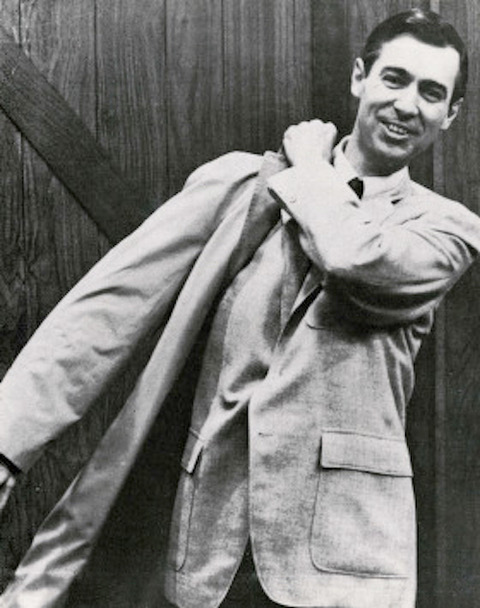
It’s fitting that the release of “A Beautiful Day in the Neighborhood,” the feature film celebrating public TV icon Fred Rogers, was timed to coincide with the holidays.
While the early box office numbers suggest the film won’t top the financial charts, it’s earned strong accolades, both from professional critics and filmgoers.
Like so many great film stories, this one is based on truth, tweaked for dramatic effect. It’s not the first magazine article turned into a film, though that’s a rare path. And it tells you something about the central premise of that 1998 Esquire article by Tom Junod. I found it worthy reading before seeing the movie.
Just as worthy (and more pertinent to this blog post) is this New York Times article about Tom Hanks, the American everyman actor who will surely be nominated for an Oscar for his performance as the legendary children’s television host.
Writer Taffy Brodesser-Akner’s article confirmed to me the authenticity of Mr. Rogers, as well as the unlikely celebrity’s care for Junod, for journalism, and for what Junod and so many of us care about most deeply: great storytelling.
These two paragraphs from the story capture the essence of it for me:
“… Neither the movie nor the magazine article tell the real back story of the meeting: Junod profiled Fred Rogers after writing a story in 1997 in which he, in effect, outed Kevin Spacey (who only recently revealed that he is gay, after a #MeToo scandal). The story briefly made Junod something of a pariah in Hollywood, and flung him into soul searching about the kind of writer he wanted to be. He’d had a ruthlessness to him, he told me in Toronto. He didn’t want to be ruthless anymore.”
Then this:
“It was then that he met Mister Rogers, who prayed for him and his family every day, and who kept a file on Junod, which the screenwriters, Micah Fitzerman-Blue and Noah Harpster, found in Rogers’ archives in Pittsburgh. In that file, he laid out four pillars of journalism that he hoped Junod would stick to: 1. Journalists are human beings, not stenographers; human beings, not automatons. 2. Point out injustice when you have to. 3. Point out beauty when you can. 4. Be aware of celebrating the wonders of creation.”
While it’s truly remarkable that Mr. Rogers prayed for Junod and his family (and very much in keeping with who he was), I’m most impressed that this oracle of cultural civility could provide such a compact storytelling recipe with wide application for journalism and all storytellers.
Let’s consider the Mr. Rogers recipe in context of our current society, as we spin from one 15-minute news cycle to the next, 24 hours a day, seven days a week, as our smartphones buzz and flash us the latest stenographic alerts about everything from our next meeting to the unpredictable weather and the latest world crisis.
As Mr. Rogers put it: Journalists are human beings, not stenographers; human beings, not automatons. Great storytellers, whether they are journalists or public relations professionals, CEOs or kindergarten teachers, understand that every story demands more than “just the facts, ma’am.” A stenographer or an AI bot doesn’t provide humanity. In other words, every story has the journey of at least one hero at its heart.
Point out injustice when you have to. Clearly, Fred Rogers understood a central (and uncomfortable) premise of so much great journalism, and storytelling. Why do great stories have heroes at their center? Because heroes arise from conflict, and often from injustice. We don’t need heroes to mow our lawn, we need them to solve problems that others can’t. Duh. That’s what makes them heroes!
Point out beauty when you can. As a former journalist myself (20 years in the trenches, check it out), one of my biggest peeves about our current climate is that journalistic critics forget that great storytelling inspires joy and empathy and laughter, as well as anger or frustration or sadness.
This reminds of one of the most famous (and most incorrectly attributed) quotes about journalism, which originally came from a fictional Irish Chicago bartender named Mr. Dooley in columns by Chicago Evening Post journalist and humorist Finley Peter Dunne (note: I cleaned up the original to improve comprehension):
“The newspaper does everything for us. It runs the police force and the banks, commands the military, controls the legislature, baptizes the young, marries the foolish, comforts the afflicted, afflicts the comfortable, buries the dead and roasts them afterward.”
Many remember the section of the quote I boldfaced. Most forget the rest. It describes the centrality of great journalism — and great storytelling — in any society.
Be aware of the wonders of creation. The last ingredient in Fred Rogers’ recipe for journalism is a great foundational principle of ALL storytelling. It explains the unexplainable. We often see Mark Twain’s quote, “Truth is stranger than fiction.” We rarely see the second half of it: “but it is because fiction is obliged to stick to possibilities; truth isn't.”
In other words, what happens in our real world is often too unbelievable (or as Fred Rogers saw it, faith-inspiring) to be dismissed. As Dave Barry, one of my favorite humor columnists puts it, "I am not making this up!"
This brings me home, to the three storytelling principles we practice at WordWrite with our clients. They apply equally to journalism and all storytelling. The elements of a story worth sharing, whether it’s an article by Tom Junod, a film by director Marielle Heller, or even a humble blog post written by me, are:
- The story must be authentic.
- It’s shared by a fluent storyteller.
- The storyteller continually reads the audience to ensure they’re part of the story, too.
Whatever you may think of Fred Rogers (and yes, there are Fred Rogers haters), can you doubt his commitment to authenticity? Judge for yourself. Read the Esquire article, see “A Beautiful Day in the Neighborhood” or the excellent 2018 documentary “Won't You Be My Neighbor?”
Whatever you think of Fred Rogers, can you deny that he was a fluent storyteller? He used music, make-believe puppets and even 10 seconds of silence on a live TV awards show to translate his message into real-world action.
Did Fred Rogers speak to his audience in a way that kept them engaged? Well, he died in 2003 and they’re still making movies about him. His production company is still in business and still making shows that bear his unmistakable fingerprint. What does that tell us?
Want to learn more about our take on storytelling? Contact me directly. Feel free to share your own take on Fred Rogers or storytelling in the comments — and thanks for reading.
